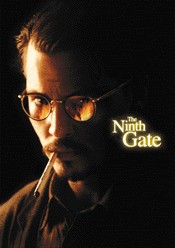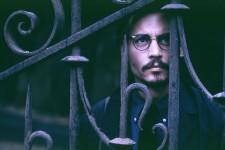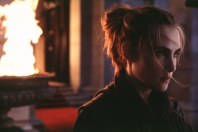|
The Ninth
Gate
|
| |
 |
USA,
2000. Rated R. 127 minutes.
Cast: Johnny Depp, Frank Langella,
Lena Olin, Emmanuelle Seigner, Barbara Jefford, Jack Taylor, James Russo
Writers: Arturo Perez-Reverte
(novel: The Club Dumas), John Brownjohn, Roman Polanski, Enrique
Urbizu
Music: Wojciech Kilar
Cinematographer: Daruis Khondji
Producer: Roman Polanski
Director: Roman Polanski
|
| Grade: C+ | Review by Jeff Vorndam |
 ere's
a quick test to see if you will like Roman Polanski's newest film: Does the
phrase "The Nine Gates of the Kingdom of the Shadows" conjure a pall of fear,
or does it make you giggle? If it's the latter, then The Ninth Gate just
might be your kind of movie. Similar to last year's Sleep
Hollow, it's a sumptuous piece of eye-candy with a markedly underthought
plot. The films share a camp sensibility that has become de rigueur for
horror films. Today's scary movies aren't actually supposed to disturb us; they're
meant to be fun. I had less fun watching The Ninth Gate than I did Sleepy
Hollow, most likely due to the story's sloth-like progression. The slower
pace allows the wandering eye to soak up the onscreen details though, and Polanski,
ever the meticulous craftsman, still furnishes enough peculiarity to make the
film an interesting time-filler.
ere's
a quick test to see if you will like Roman Polanski's newest film: Does the
phrase "The Nine Gates of the Kingdom of the Shadows" conjure a pall of fear,
or does it make you giggle? If it's the latter, then The Ninth Gate just
might be your kind of movie. Similar to last year's Sleep
Hollow, it's a sumptuous piece of eye-candy with a markedly underthought
plot. The films share a camp sensibility that has become de rigueur for
horror films. Today's scary movies aren't actually supposed to disturb us; they're
meant to be fun. I had less fun watching The Ninth Gate than I did Sleepy
Hollow, most likely due to the story's sloth-like progression. The slower
pace allows the wandering eye to soak up the onscreen details though, and Polanski,
ever the meticulous craftsman, still furnishes enough peculiarity to make the
film an interesting time-filler. 
Brushing aside troubling concerns over whether an esteemed director like Polanski
should be making interesting time-fillers at all, The Ninth Gate fails
as a suspense story after a promising beginning. The prologue, a quiet set-piece
depicting a man hanging himself in his study, is gravely still. The camera settles
on the stool that is kicked away, rather than the neck which is strangled. The
mood is set for a slow-burning odyssey into a nether world of decayed trust
and bloody transactions. A long opening-credits sequence sustains the iniquitous
vibe, spitting us out into a Manhattan estate where Dean Corso (Johnny Depp)
is hornswoggling antique books from a money-hungry pair of inheritors. Depp
turns in a workman-like performance that allows him to wear an even slimier
mustache than the one he cultured for Donnie Brasco. Corso is rarely
seen without some dark brown alcoholic drink in his hand, and one of the oddities
of the film is that every room is equipped with a decanter. Lingering over the
art design in these ample stately rooms is a primary pleasure in this film.
Brimming with mahogany and decadent bric-a-brac, these settings overwhelm the
characters that inhabit them. Dialogue feels leaden, sunk into the poshness
of its surroundings.
As an unscrupulous book sleuth, Corso consorts with shady company, chiefly
one Boris Balkan (Frank Langella, wearing some nifty coke bottle lenses). Mr.
Balkan is one of those Satanist book collectors–you know the type; they're always
attempting to conjure the devil to do their bidding. (What they would have him
do is anyone's guess.) Balkan pays Corso a princely sum to track down two possible
variations of a tome called "The Nine Gates of Kingdom of the Shadows" (snicker),
a book that apparently can indeed manifest the devil. Balkan's own copy of the
book isn't producing any results, however. He suspects his copy may be just
that–a copy–and that an authentic version exists that will have the magic. Corso,
of course, doesn't believe this nonsense, but he does believe in the large paycheck
he's getting, so it's off to Europe to authenticate Balkan's book against the
other two known copies. 
As is to be expected, danger stalks him at every turn, as dead bodies and a
mysterious Girl (Emmanuelle Seigner, playing the role of the beautiful woman
who slept with the director to get this part) keep popping up. We never do find
out exactly why Balkan needs Corso to all the dirty work. At one point, it becomes
that clear he's been monitoring Corso all along, and that he could easily have
accomplished everything that Corso has. Further muddling matters, the wife of
the guy who hanged himself in the first scene is burning down estates and drowning
people to get at the same books for her own Satanic rituals (can't these Satanists
all just get along?) She is played by Lena Olin, and the spittle that flies
from her teeth indicates she is incapable of underacting. This is a good thing,
because Depp is soporifically involved in disappearing into his character and
Seigner is best seen and not heard.
To paraphrase a line from Magnolia,
none of this will make sense in the end. Corso's motivation somehow changes
from greed to pure curiosity (or a lust for evil). The irony is that a character
we had feared for is now the character we fear. On top of that, Polanski
hints that The Girl is an associate of Balkan's, but a climactic fiery copulation
scene intimates that she may be "the guy behind the guy." This revelation stands
the film upon its head, and Polanski further rewards us with a final shot that
may be the weakest pay-off since the opening of Al Capone's vaults. We're left
feeling much like we were after watching that live Geraldo Rivera special event–that's
it?? At least it took a long time to get there!
To be fair, the movie is watchable throughout. Polanski's tongue never strays
far from his cheek and you can tell he thinks Satanism is more silly than scary.
A particularly hilarious scene has Balkan frightening a pack of old frumpy Satanists
with a hearty "Boo!" that sends them scampering away like gremlins in bright
light. The resemblance of the orgy in The Ninth Gate to the one in Eyes
Wide Shut is close enough to evoke titters from an audience wishing
they were watching a more intelligible film like Kubrick's. Other fun things
to watch for are Corso's tendency to get his ass kicked by women in almost every
scene, an imposing Frau's fetish for oranges, and two ancient twins who are
96% eyebrows and mustache.
The wafts of goofiness that creep into every other scene keep The Ninth
Gate from being a bad movie, though I wish Polanski had either decided to
go for an all-out parody (a la Fearless Vampire Killers) or sinister
black comedy (a la The Tenant). Instead, it's only half-amusing and half-suspenseful,
but never quite satisfying. Darius Khondji's cinematography provides the necessary
sepia tones and lush scenery, but is sometimes too ostentatious for its own
good (there's a lovely shot of Corso riding on the back of a truck with a rainbow
in the background that serves no purpose other than to look beautiful). Polanski
is still spinning his wheels here–he has made only one interesting movie (Death
and the Maiden) since The Tenant, and I hope he still has something
left. The Ninth Gate doesn't show him expending much of his talent. Perhaps
his contract with the Devil expired in 1976....
Review
© March 2000 by AboutFilm.Com and the author.
Images © 1999 Artisan Entertainment. All rights reserved.



